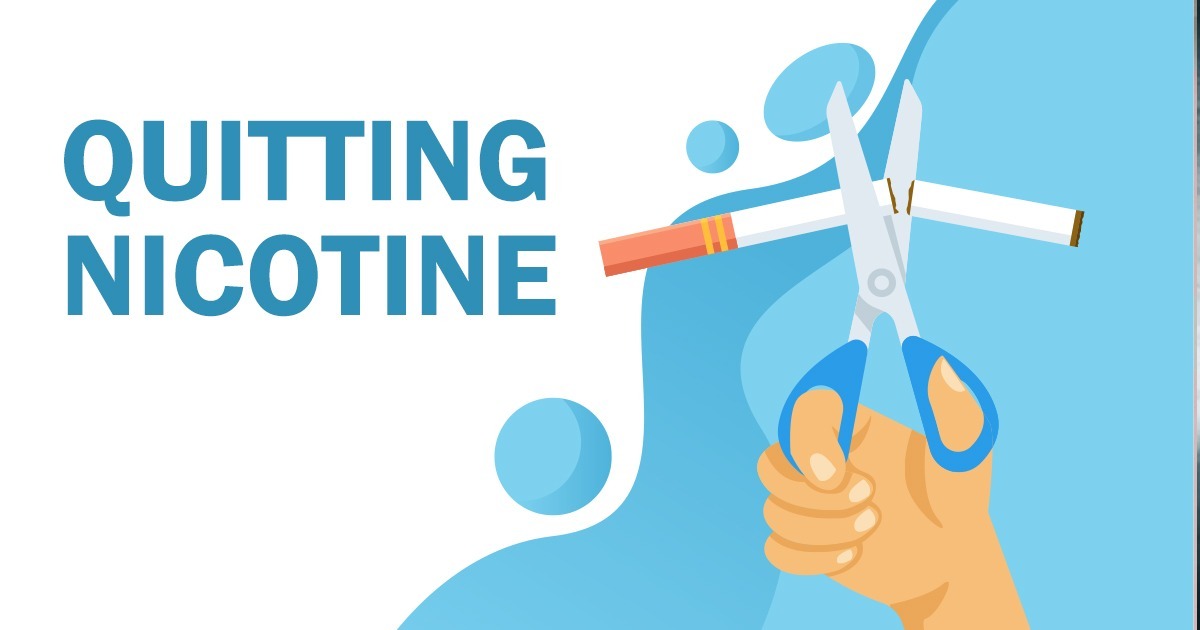
Many people will tell you that quitting nicotine is the hardest thing they ever do. Despite the immense challenges, it is possible to stop smoking and using nicotine products in general. We’ll discuss more addiction and nicotine withdrawal symptoms. We’ll also mention some of the things you can do to deal with physical symptoms and psychological symptoms of an addiction to nicotine. Options include nicotine patches and other nicotine replacement therapy, support groups, and working with a professional counselor.
There’s a lot to look forward to in a nicotine-free life; when you decide to quit using tobacco for good, the health benefits include:
- Reduced risk of heart disease
- Lower risk of a heart attack
- Less exposure to secondhand smoke for the people around you
- Improved your overall lung health
How Does Nicotine Work?
Understanding why quitting nicotine is so challenging relies on understanding just how this potent drug works. If you use something with nicotine, your brain and body are being exposed to a stimulant. A stimulant speeds up processes in your body and central nervous system. A chemical containing nitrogen, nicotine is made by plants like the tobacco plant. There’s also synthetic production.
On its own, nicotine doesn’t increase the risk of lung cancer or have significant adverse health effects. The issue comes from the fact that since it is so addictive, you can become dependent on tobacco products that are cancer-causing and dangerous. Snorting or chewing tobacco will release more nicotine into your body than smoking, but smoking is America’s most common preventable cause of death.
Interestingly, nicotine is both a stimulant and also a sedative. When you first expose your body to nicotine, you’ll experience a kick. This kick occurs because nicotine stimulates your adrenal glands; adrenal stimulation causes an adrenaline release. Adrenaline stimulates the rest of your body, causing a glucose release.
Other short-term effects include an increase in blood pressure, breathing and heart rate. Your pancreas produces less insulin in response so that you might have an increase in your blood sugar.
Nicotine Addiction and Dependence
Nicotine addiction is physical and behavioral. Physical dependence means that you crave the chemical. Behavioral addiction refers to situations where you might be used to using tobacco in particular situations, and you want to keep doing that. For example, you might always find yourself smoking when you feel stress, which can be a sign of behavioral addiction.
As we talked about above, when you use nicotine, it creates pleasant feelings and sensations in your mind and body. Your brain releases neurotransmitters, including dopamine, creating feelings of pleasure and happiness. These pleasant effects are one way you can develop an addiction to nicotine. Signs of addiction include:
- You’re not able to stop using tobacco
- You experience withdrawal symptoms when you don’t use nicotine
- You have a desire to continue using tobacco even though it’s causing adverse outcomes, such as health risks
- Someone with an addiction to nicotine will keep using tobacco despite harmful effects on their life
Symptoms of nicotine withdrawal and common side effects can include:
- Anxiety
- Depression
- Changes in mood
- Irritability
- Problems concentrating
- Nicotine cravings
- Feelings of emptiness
- Upset stomach
- Aches and pains
- Eating more
- Weight gain
- Restlessness
According to the American Heart Association, it’s one of the hardest things to quit when you use tobacco. Quitting nicotine can be as hard as stopping heroin, mainly heavy smokers in stopping or long-term tobacco users. In many cases, the more cigarettes you have per day, the more difficult it might be to go through the withdrawal symptoms from nicotine.
So, how long does withdrawal last?
For most current smokers, quitting nicotine and nicotine withdrawal symptoms will start anywhere from one to three hours after your last tobacco use. Symptoms in a nicotine addict can last a few days up to a few weeks. Some people experience tobacco cravings for months or even years.
Can Your Lungs Heal After Smoking?
As we mentioned above, it’s not necessarily nicotine itself that’s harmful to your health. Instead, the products containing nicotine are dangerous and can cause conditions like lung cancer and lung damage. Your lungs can clean and repair themselves over time, luckily, but maybe only to an extent.
After you stop smoking and end your toxic chemical exposure, your lungs can begin to not only heal but also regenerate. How quickly your lungs can heal depends on how long you used tobacco and the extent of the damage. Two types of permanent and potentially irreversible damage can occur, which are emphysema and chronic bronchitis. Even so, quitting nicotine and tobacco products can help you avoid worse damage, and you may see improvements in your lung health and your quality of life.
Tips for Quitting Nicotine
If you’re interested in quitting nicotine, some methods may be helpful for you. First, as is the case with other types of addiction, you’ll need to prepare yourself to change your routines and behaviors. Specific treatment options to reduce tobacco cravings include:
Cessation Medications and Nicotine Replacement Products
Medications can help you stop using tobacco and reduce cravings. One of the more popular options is nicotine replacement therapy. Nicotine replacement therapy includes:
- Nicotine inhalers
- Nasal sprays
- Lozenges
- Nicotine gum
- Nicotine patches.
Some people might use electronic cigarettes to help them with intense cravings, but you have to be mindful that these can also put you at risk for lung disease and other harmful chemicals. When you take a nicotine replacement medication, it provides you with nicotine, but not the other chemicals in tobacco. Another option that a professional might prescribe to you is an antidepressant. Antidepressants can improve your mood by increasing your dopamine production. More dopamine production may help you stop using tobacco.
Therapy and Support Groups
You can work with a professional therapist or counselor as you go through the common withdrawal symptoms. You might also choose an in-person or virtual support group. Support groups help tackle all types of addiction, and you can learn better coping skills and be with people who are going through something similar to your situation.
Lifestyle Changes
When you’re quitting nicotine, you’ll want to make sure that you’re identifying new ways to cope with stress and cravings.
There are a lot of lifestyle changes that might work for you.
- You might focus on getting regular physical activity.
- Keep your hands and mouth busy with healthy snacks or gum.
- Remove temptations from your home, and try to avoid situations that could trigger you, such as hanging around with smokers.
- When you’re quitting nicotine, you should also set manageable and achievable goals and treat yourself when you meet those goals.
- Some people find that alternative remedies help with their addiction, like acupuncture, the use of certain herbs, essential oils, and hypnosis.
It’s never easy to beat any addiction, and many people say overcoming nicotine dependence is one of the hardest things they ever do.
If you’d like to learn more about professional support and create healthy coping skills for addictions to nicotine or any other substance, we encourage you to contact Anchored Tides Recovery at 866-600-7709. With professional help, you can improve your chances to kick the addiction.































